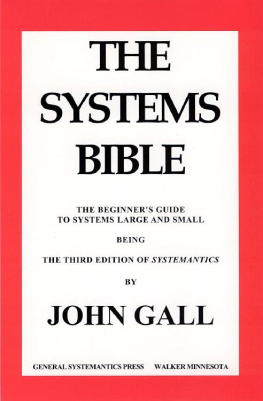John Gall [Gall - SYSTEMANTICS. THE SYSTEMS BIBLE
Here you can read online John Gall [Gall - SYSTEMANTICS. THE SYSTEMS BIBLE full text of the book (entire story) in english for free. Download pdf and epub, get meaning, cover and reviews about this ebook. year: 2012, publisher: GENERAL SYSTEMANTICS PRESS, genre: Computer. Description of the work, (preface) as well as reviews are available. Best literature library LitArk.com created for fans of good reading and offers a wide selection of genres:
Romance novel
Science fiction
Adventure
Detective
Science
History
Home and family
Prose
Art
Politics
Computer
Non-fiction
Religion
Business
Children
Humor
Choose a favorite category and find really read worthwhile books. Enjoy immersion in the world of imagination, feel the emotions of the characters or learn something new for yourself, make an fascinating discovery.
- Book:SYSTEMANTICS. THE SYSTEMS BIBLE
- Author:
- Publisher:GENERAL SYSTEMANTICS PRESS
- Genre:
- Year:2012
- Rating:5 / 5
- Favourites:Add to favourites
- Your mark:
- 100
- 1
- 2
- 3
- 4
- 5
SYSTEMANTICS. THE SYSTEMS BIBLE: summary, description and annotation
We offer to read an annotation, description, summary or preface (depends on what the author of the book "SYSTEMANTICS. THE SYSTEMS BIBLE" wrote himself). If you haven't found the necessary information about the book — write in the comments, we will try to find it.
John Gall [Gall: author's other books
Who wrote SYSTEMANTICS. THE SYSTEMS BIBLE? Find out the surname, the name of the author of the book and a list of all author's works by series.
SYSTEMANTICS. THE SYSTEMS BIBLE — read online for free the complete book (whole text) full work
Below is the text of the book, divided by pages. System saving the place of the last page read, allows you to conveniently read the book "SYSTEMANTICS. THE SYSTEMS BIBLE" online for free, without having to search again every time where you left off. Put a bookmark, and you can go to the page where you finished reading at any time.
Font size:
Interval:
Bookmark:
SYSTEMANTICS
THE SYSTEMS BIBLE
THE BEGINNER'S GUIDE TO SYSTEMS LARGE AND SMALL
BEING THE THIRD EDITION O F SYSTEMANTICS
BY
JOHN GALL
Illustrated by D. H. Gall
GENERAL SYSTEMANTICS PRESS WALKER MINNESOTA
Third Edition, Copyright 2002 by John Gall
Second printing 2006
Third printing 2011
Version 3.5 2012
This Third Edition has been extensively revised and expanded by the addition of several new Chapters including new Axioms, Theorems, and Rules of Thumb, together with many new case histories.
Printed at Saline, Michigan, by McNaughton & Gunn. Text is 11 pt. Times Roman. Illustrated by D. H. Gall.
Library of Congress Control Number: 2002095534
Library of Congress Cataloging in Publication Data:
Gall, John, 1925-
Systemantics.
First ed. published in 1975 under title: General Systemantics. Published by Quadrangle/The New York Times Book Company, Inc., 1977.
Second ed., first printing 1986.
Third edition 2002.
Bibliography: p. 1.
System theory-anecdotes, facetiae, satire, etc.
I. Title
For paperback edition: ISBN 0-9618251-7-0
Published by: The General Systemantics Press
7027 So. Walker Bay Rd., N.W.
Walker, MN 56484.
FAX: (218) 547-0195.
Website: www.generalsystemantics.com .
TO MY ALMA MATER
ST. JOHNS COLLEGE
for having the courage to be different and for
encouraging me to be the samethat is, different.
Table of Contents
To Kenneth Boulding, whose ever-fertile mind continued to sprout new concepts for the new age, and who encourage d Systemantic s when it was still but a sprawling pup;
To Robert L. Weber, author o f A Random Walk In Scienc e , who recognize d Systemantic s as a sister endeavor and wrote the review that provided it with entree into the Establishment of Humane Letters;
To W. Evert Welch, who joyfully and freely shared the wisdom acquired in a lifetime of close encounters with Systems;
And to Hamilton Armstrong, George I. Brown, Richard Byrne, Kathleen Ursin, William E. Powers, S. A. Lanzarotta, R. L. Payton, Edward G. Prentice, Frederick R. Cronin, William Delaney, Helen Harte, Johann Klaassen, and many others, for stimulus, encouragement, and support.
The immediate motivation for undertaking this work was provided by the bizarre experience of a colleague of the author (let us call him Jones), a medical scientist specializing in the study of Mental Retardation. That field until recently was a very unfashionable one for investigation, and Jones considered himself fortunate to be employed as Research Associate at a small State Home for Retarded Children. In this humble, even despised position, he was too low on the Civil Service scale to merit the attention of administrators, and he was therefore left alone to tinker with ideas in his chosen field. He was happily pursuing his own research interests when, following Presidential interest and national publicity, Mental Retardation suddenly became a fashionable subject. Jones received an urgent invitation to join an ambitious federally-funded project for a systematic attack upon the problem of mental retardation.
Thinking that this new job, with its ample funds and facilities, would advance him in his own career while also facilitating his research, Jones joined. Within three months his research had come to a haIt, and within a year he was unable to speak or think intelligently in the field of mental retardation . He had, in fact, become retarde d relative to his previous condition.
Looking about him to discover, if possible, what had happened, Jones found that a dozen other skilled professionals who made up the staff of the project had experienced a similar catastrophe. That ambitious project, designed to advance solutions to the problem, had in fact taken most of the available workers in the field and neutralized them.
What had gone wrong? Jones, knowing of the authors interest in Systems Operation, turned to him for advice, and the two investigators jointly tried to analyze the problem. They first of all reviewed Parkinsons classic essay on Institutional Paralysis hoping to find enlightenmen t there. Was the disease a fulminating case of Injelititis? Obviously not: the professional staff of the Institute were competent, dedicated, and hardworking. Furthermore, the administrators were experienced, energetic, and extremely logical in their approach to problems . The Institute was failing in spite of the best efforts of every one of its member s .
Was it an example of the Peter Principle , in which members of the staff had ascended the hierarchy until they had reached jobs for which they were not fitted? No. This was a new organization, and no one had been promoted very far . Slowly it began to dawn upon the investigators that we humans do not yet understand the basic laws governing the behavior of complex organization s . A great enterprise can flounder helplessly or even wither away before our very eyes, as a result of malignant but as yet unnamed disorders, or in response to the operation of natural laws whose Newton has not yet been born to announce them to Mankind.
Faced with this realization, and moved by the dramatic and touching crisis that had overtaken his colleague, the author resolved to redouble his researches into the causes of organizational ineptitude and Systems malfunction, seeking deep below the surface for the hidden forces that cause the best-laid plans to gang agley. Little did he suspect, at that moment, where those studies would lead. He had not yet experienced the blinding illumination of the OPERATIONAL FALLACY. The FUNDAMENTAL THEOREM OF SYSTEMANTICS lay well over the horizon. Even the relatively simple and easy-to-understand GENERALIZED UNCERTAINTY PRINCIPLE was not yet a gleam. Those and other deep- ranging and depressing generalizations were to come only much later, after many minutes, hours, even days of exhaustive researches conducted under the least auspicious circumstances.
What follows is the fruit of those researches, set forth as briefly and as simply as possible, in a style that is deliberately austere and (the author may be permitted to hope) even not without a certain elegance, derived from the essentially mathematical nature of the science itself. The reader must imagine for him-or-herself at what cost in blood, sweat, and tears and in time spent in deep observation of contemporary Systemsthese simple statements have been wrung from the messy complexity of the real world. They are offered in the hope and faith that a knowledge of the natural laws of complex Systems will enable Mankind to avoid some of the more egregious errors of the past.
At the very least it is hoped that this little book may serve as a warning to those who read it, thus helping to counter the headlong rush into Systemis m that characterizes our age. And who knows? Perhaps readers of this modest treatise will be stimulated to discover new Systems- insights of their own, that can lead to even higher achievements for the infant science of Systemantics.
We are forced to report that in the interval since the original edition o f Systemantic s , no significant improvement in Systems-behavior has taken place. Indeed, the unexpected antics of certain truly Colossal Systemsfor example, the radioactive decay of the Nuclear Power Industryhave surprised even some who (having been exposed to previous exhibitions of Large-Systems behavior) had thought themselves beyond surprise.
Nor has Coping with Systems become any easier. Computers have brought with them a host of new opportunities for malfunctions at the interface between Systems and the hapless Individual. A bank customer may be presented with a bill for the whole banks overhead for the month; a credit-card holder may be held accountable for everyones purchases. Furthermore, as these examples suggest, increasing Consolidation and Centralization have raised the stakes in cases of error. A broken pipe in a Nuclear Power Plant can cut off the power to an entire Province or even a whole nation. In Detroit, a computer, having been fed all the votes in a major election (over a million in all), refused to tell how many were for whom. At last report the votes were still being tallied by hand.
Font size:
Interval:
Bookmark:
Similar books «SYSTEMANTICS. THE SYSTEMS BIBLE»
Look at similar books to SYSTEMANTICS. THE SYSTEMS BIBLE. We have selected literature similar in name and meaning in the hope of providing readers with more options to find new, interesting, not yet read works.
Discussion, reviews of the book SYSTEMANTICS. THE SYSTEMS BIBLE and just readers' own opinions. Leave your comments, write what you think about the work, its meaning or the main characters. Specify what exactly you liked and what you didn't like, and why you think so.













